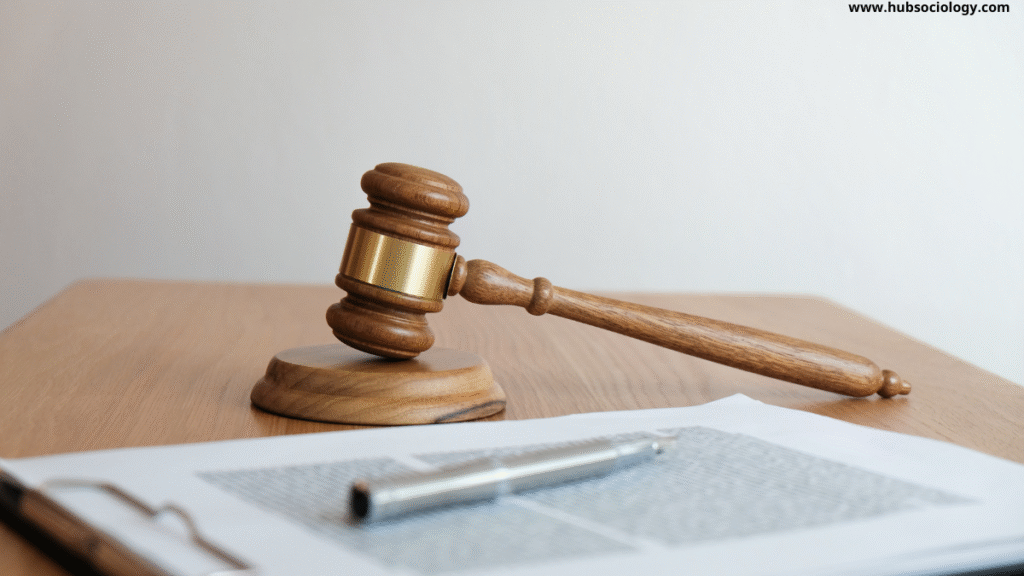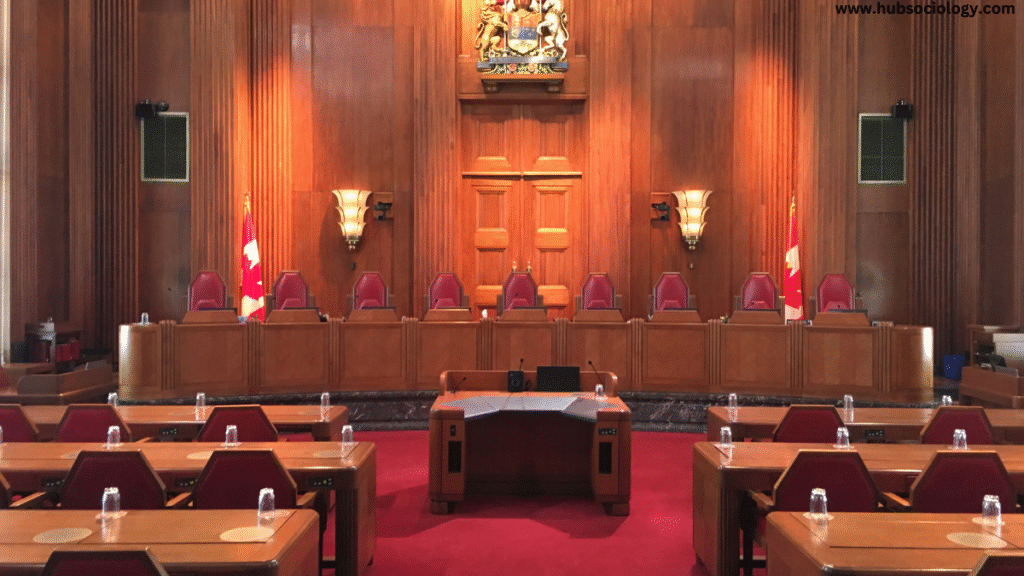Introduction on Foucault’s Concept of Discourse
Michel Foucault, one of the most influential postmodern thinkers of the 20th century, revolutionized the way we understand power, knowledge, and social institutions. Central to his work is the concept of discourse, which refers to the structured ways in which language, ideas, and practices shape social reality. For Foucault, discourse is not merely about communication; it is a system of representation that governs how knowledge is produced, what can be said, and who has the authority to speak.
In sociology, Foucault’s theory of discourse provides a framework for analyzing how power operates through language, institutions, and everyday practices. This article explores Foucault’s concept of discourse, its relationship with power and knowledge, and its sociological implications in shaping identities, institutions, and social norms.

Defining Discourse in Foucauldian Terms
Foucault’s notion of discourse goes beyond the common understanding of speech or written communication. Instead, he defines discourse as:
“Systems of thoughts composed of ideas, attitudes, courses of action, beliefs, and practices that systematically construct the subjects and the worlds of which they speak.”
In simpler terms, discourse refers to the rules and structures that determine what can be said, who can speak, and what counts as truth in a given historical and social context. Discourses are not neutral; they are embedded in power relations and shape how we perceive reality.
Key Characteristics of the Concept of Discourse
- Historical and Contextual – Discourses emerge in specific historical periods and change over time. For example, the discourse on madness in the 18th century (viewed as moral failing) differs from modern psychiatric discourse (seen as a medical condition).
- Regulated and Structured – Discourses follow implicit rules that determine what is sayable and unsayable. Institutions like medicine, law, and education enforce these rules.
- Power-Knowledge Nexus – Foucault argues that knowledge is never neutral but is always tied to power. Those in charge of speech decide what constitutes “truth”
- Constructs Subjectivity – Discourse shapes identities (e.g., the “criminal,” the “patient,” the “deviant”) by defining categories of people.
Discourse, Power, and Knowledge
Foucault’s well-known claim that “power produces knowledge” emphasizes how language serves as a conduit for the exercise of power. Unlike traditional Marxist views that see power as repressive (coming from the top down), Foucault sees power as productive—it creates realities, norms, and truths.
How Power Works Through Discourse
- Exclusionary Mechanisms – Certain discourses are suppressed or marginalized. For example, in the 19th century, women’s voices were excluded from scientific discourse, reinforcing patriarchal structures.
- Institutional Authorization – Institutions (e.g., universities, courts, media) validate certain discourses as “truth.” Medical discourse, for instance, defines what counts as “normal” and “pathological.”
- Disciplinary Power – Foucault’s “Discipline and Punish” (1975) shows how discourses in prisons, schools, and hospitals regulate behavior by defining norms and deviations.
Example: The Discourse of Sexuality
Foucault questions the “repressive hypothesis”—the notion that sexuality was suppressed in Victorian society—in “The History of Sexuality” (1976). Instead, he argues that discourse on sexuality proliferated—through medicine, psychology, and law—creating categories like “homosexual,” “pervert,” and “hysterical.” Thus, power did not silence sexuality but produced new forms of knowledge and control.
Discourse and Social Institutions
Sociologically, discourse shapes institutions by defining their objectives, hierarchies, and modes of operation.
1. Medical Discourse
- Defines what constitutes illness and health.
- Establishes medical professionals as authorities.
- Marginalizes alternative healing practices (e.g., traditional medicine).
2. Legal Discourse
- Decides what constitutes “crime” and who qualifies as a “criminal.”
- Reinforces state control through laws and penal systems.
- Legitimizes certain forms of punishment (e.g., imprisonment over rehabilitation).

3. Educational Discourse
- Standardizes curricula, defining “valid” knowledge.
- Produces disciplined subjects through exams and grading.
- Reinforces class hierarchies by privileging certain forms of knowledge over others.
Concept of Discourse and Identity Formation
Foucault’s work shows how discourse constructs social identities. Subjects (individuals) are not pre-existing entities but are produced through discourse.
Examples:
- The “Madman” – Psychiatric discourse in the 19th century constructed madness as a medical condition, leading to institutionalization.
- The “Criminal” – Legal discourse defines certain behaviors as criminal, shaping public perception of offenders.
- The “Homosexual” – As Foucault notes, before the 19th century, same-sex acts were considered sinful but not tied to an identity. Medical discourse later classified homosexuality as a psychological condition, creating a new social identity.
This process, called subjectification, means individuals internalize discourses, regulating their own behavior (e.g., a student internalizing the need to perform well in exams).
Critique of Foucault’s Concept of Discourse
While Foucault’s theory is groundbreaking, it has faced criticism:
- Overemphasis on Power – Some argue Foucault neglects human agency, making individuals seem like passive products of discourse.
- Relativism – If all knowledge is discourse-bound, does that mean there is no objective truth?
- Lack of Normative Stance – Foucault avoids prescribing how society should be, focusing only on how power operates.
Despite these critiques, his work remains essential for understanding how language, power, and institutions shape social life.
Conclusion on Concept of Discourse
Foucault’s concept of discourse provides sociologists with a powerful tool to analyze:
- How knowledge is socially constructed.
- How language and institutions are used to covertly exercise power.
- How identities are formed and regulated.
By studying discourse, sociologists can uncover hidden power structures in education, media, law, and medicine. Foucault’s work encourages us to question taken-for-granted truths and consider how alternative discourses can challenge dominant power relations.

In an era of misinformation, media control, and institutionalized biases, Foucault’s insights remain crucial for understanding—and resisting—the mechanisms of power in society.
Highly Recommended Books
- The Idea of the Postmodern: A History by Hans Bertens – Amazon Link – https://amzn.to/45IgEMY
- Fontana Postmodernism Reader by Walter Truett Anderson – Amazon Link – https://amzn.to/4kZFmgx
- Sociological Theory by George Ritzer – Amazon Link – https://amzn.to/3FtNzui
Topic Related Questions on Concept of Discourse
5-Mark Questions on Concept of Discourse (Short Answer)
- Define Foucault’s concept of discourse.
- What is the relationship between power and knowledge in Foucault’s theory?
- Give an example of how discourse shapes social identity.
- What are the exclusionary mechanisms in discourse?
- How does discourse differ from ordinary language?
- Name two institutions where discourse operates as a form of power.
- What does Foucault mean by “power is productive”?
- How does medical discourse construct the concept of illness?
- Briefly explain Foucault’s idea of “subjectification.”
- Why does Foucault reject the repressive hypothesis in The History of Sexuality?
10-Mark Questions on Concept of Discourse (Brief Essay-Type)
- Explain Foucault’s view on how discourse constructs reality.
- Discuss the role of institutions in shaping discourse, with an example.
- How does Foucault’s concept of discourse challenge traditional notions of power?
- Analyze the connection between discourse and social control in Discipline and Punish.
- Compare Foucault’s idea of discourse with Marxist views on ideology.
- How does discourse regulate what is considered “truth” in society?
- Discuss Foucault’s critique of the repressive hypothesis in the context of sexuality.
- Explain how educational discourse reinforces power structures.
- What are the key characteristics of Foucauldian discourse?
- How does discourse contribute to the formation of deviant identities?
15-Mark Questions on Concept of Discourse (Long Essay-Type)
- Critically examine Foucault’s concept of discourse and its sociological significance.
- “Power produces knowledge.” Discuss this statement in the context of Foucauldian discourse.
- How does Foucault’s theory of discourse explain the construction of social norms and identities? Provide examples.
- Analyze the role of discourse in modern institutions like medicine, law, and education.
- “Discourse is a system of thought that governs what can be said.” Elaborate on this with reference to Foucault’s works.
- Evaluate the strengths and weaknesses of Foucault’s discourse theory in understanding power relations.
- How does Foucault’s Archaeology of Knowledge contribute to the study of discourse?
- Discuss Foucault’s argument that discourse is not just about language but about power and control.
- Compare and contrast Foucault’s concept of discourse with Gramsci’s theory of hegemony.
- “Discourse shapes subjectivity.” Explain this statement with reference to Foucault’s works.
